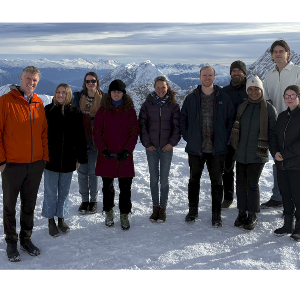Professorship for Physical Geography with a focus on Oceanography



Earth System Models (ESM) do not yet depict observed climatic changes in the Southern Ocean adequately | © Alexander Haumann
Our group wants to raise awareness for the important role of the ocean and polar regions in the Earth’s system and how they are changing to strengthen efforts to limit human influences on the ocean, ice, and climate. In particular, with our work, we want to understand the essential role of the Southern Ocean, which encircles the Antarctic continent, in mitigating global climate change in the past, present, and future, and how this highly sensitive region of our planet responds to climatic changes.
The Southern Ocean strongly influences the global climate through its interaction with Earth’s carbon, water, and energy budget. This important role arises from the vast exchange of water between the deep ocean and the sea surface that is unprecedented in the global ocean elsewhere. Over past decades, the Southern Ocean has substantially slowed global surface warming by absorbing most of the excess heat in the climate system and a large fraction of the anthropogenic carbon dioxide emissions. However, over the past years the Southern Ocean has experienced drastic changes and, to date, it remains uncertain if it will continue to slow down global surface warming in future to the extent that it has been providing such a service in the past.
While climate models make an important contribution to creating reliable information for decision-makers and society, they still do not represent past observed climatic changes in the Southern Ocean region adequately, leading to considerable uncertainties in future projections. In part, these difficulties arise from the inherent challenge to collect observational data in this region and the associated knowledge gap. In our group, we collect and use observational data and deploy numerical models to better understand processes and changes in the Southern Ocean and thus contribute to improving regional and global projections with model simulations.

Professorship of Physical Geography with Focus on Oceanography
Antarctica InSync is a globally coordinated scientific program of UN Ocean Decade that will synchronize research in Antarctica and the Southern Ocean and will carry out year-round circumpolar fieldwork missions taking place in the period 2027 to 2029.
SO-SIMBA is an ESA-funded collaboration between institutes in Germany, Norway, France, Canada, and the United Kingdom that will develop and validate novel methods and satellite remote sensing products to quantify Antarctic sea ice mass balance.
MASIS is a working groud of the Scientific Committee on Oceanic Research (SCOR) that seeks to remedy current issues of data collection, quality control, and compilation of stable isotopes in seawater. This effort will permit the full use of stable isotope datasets to track changes in the hydrological and bio-geochemical cycles, as well as in the anthropogenic carbon penetration in the ocean.
The SOFIA Initiative aims to improve our understanding of the simulated response to Antarctic freshwater input, and in particular the model uncertainty. The initiative was started by the CliC/CLIVAR/SCAR Southern Ocean Regional Panel, is endorsed as a CLIVAR task team, and has been submitted as a community MIP to CMIP7.
Group Leader
I am a climate scientist fascinated by the ocean, ice, polar regions and the global carbon and water cycles. In particular, I study the impact of changing freshwater fluxes and ice on the Southern Ocean in past, present and future climates and their linkages to global changes at the interface of observations and models.
Scientific Coordinator
I have loved snow and ice since I was little, which is why I wrote my doctoral thesis on Arctic permafrost. I then shifted my professional focus to management, organization, and communication in science, which has allowed me to help shape and coordinate many projects in the Arctic and Antarctic.
Postdoc
My aim is to better understand the ocean carbon sink and its changes, with a special focus on the Southern Ocean. I study how the physics of the ocean impact the return pathways of CO2 to the surface, and for this I particularly love using data acquired on sailboats.
Postdoc
I am interested in the large-scale ocean circulation of the Southern Ocean and its impact on heat, freshwater and other physical properties. I am especially interested in understanding the interactions between different length- and time- scales of physical processes that drive ocean patterns and behaviour. In particular, I focus on in situ autonomous measurements from Argo floats.
Postdoc
In my PhD, I aim to understand the observable role that Antarctic Winter Water plays in the Southern Ocean. Antarctic Winter Water is important in connecting the polar Southern Ocean to the global ocean.
PhD student
I am an oceanographer with a passion for the high latitudes. My goal is to use non-hydrostatic models to improve our understanding of convection in the Southern Ocean, with the ultimate aim of improving how Southern Ocean convection is represented in global couple climate models.
PhD Student
Student
Master's student
I am especially interested in physical processes in the high latitudes and their impact on the climate system. In my Master’s thesis, I investigate how surface-driven supercooling impacts properties of the upper Southern Ocean. For this purpose, I am implementing a novel approach to model surface-driven supercooling in an ocean model.
Student
In a study project, I want to look at the influence of Antarctic meltwater input on the upper cell of the global meridional overturning circulation using model data
PhD student
I want to understand the physical controls behind nutrient supply to the South Georgia phytoplankton bloom using high resolution in-situ observations across the ACC.
| 06.11.2025 >>> SO-CLIM in the radio (Deutschlandfunk). Only in German |
|---|
| 03.11.- 06.11.2025 >>> In Frascati (Italy), an Antarctica InSync workshop was held with the goal of finalising a scientific plan together with experts. |
| 20.10.2025 >>> News Article about the Nature Climate Change publication in Focus (only in German) |
| 17.10.2025 >>> In a new Nature Climate Change publication, Léa and Alex give a potential explanation as to why the ocean around Antarctica is defying climate model projections and continuing to absorb CO2, despite the effects of climate change |
| 29.07.2025 >>> Alex H. quoted at EOS.org in relation to a coauthored study in PNAS |
| 25.06.2025 >>> Alex W. says goodbye 👋 |
| 06.06.2025 >>> Léa joins the presentation of Malizia Explorer in Monaco as well as the One Ocean Science Congress (OOSC) to the United Nations Ocean Conference (UNOC3) |
| 27.04.2025 >>> Alex H., Emma, Rowan & Theo were at EGU |
| 29.03.2025 >>> Alex H. & Rowan lead the Heincke Student Expedition to the North Sea with students from Munich, Düsseldorf & Bremen. Go to blog post. |
| 15.01.2025 >>> Alex H. visted Abu Dhabi for a Dialogue Meeting at Abu Dhabi Sustainability Week |
| 06.01.2025 >>> Léa joined the Malizia Vendée Show on Youtube |
Olivier, L., Haumann, F. A. (2025). Southern Ocean freshening stalls deep ocean CO2 release in a changing climate. Nature Climate Change. https://doi.org/10.1038/s41558-025-02446-3
Pan, B. J., Gierach, M. M., Stammerjohn, S., Schofield, O., Meredith, M. P., Reynolds, R. A., Vernet, M., Haumann, F. A., Orona, A. J., & Miller, C. E. (2025). Impact of glacial meltwater on phytoplankton biomass along the Western Antarctic Peninsula. Commun Earth Environ 6, 456. https://doi.org/10.1038/s43247-025-02435-6
Stammerjohn, S., Eayrs, C., Haumann, F. A., Hobbs, W., Holland, M., Reid, P., Roach, L. A., & Smith, M. (2025). Antarctic Sea-Ice : Ongoing Changes and Compelling Issues. Antarctica and the Earth System, 115–140. https://doi.org/10.4324/9781003406471-6
Olivier, L., Boutin, J., Reverdin, G., Hunt, C., Linkowski, T., Chase, A., Haentjens, N., Junger, P. C., Pesant, S., & Vandemark, D. (2025). Exploring the CO2 fugacity along the east coast of South America aboard the schooner Tara, Earth Syst. Sci. Data, 17, 3583–3598. https://doi.org/10.5194/essd-17-3583-2025
Weinhart, A. H., Haumann, F. A., Robertson, E., Meyer, H., Marent, A., & Weiner, M. (2025). Seawater stable isotopes from the southeastern Atlantic during the GO-SHIP A13.5 2024 expedition [dataset]. PANGAEA. https://doi.org/10.1594/PANGAEA.981232
Silvano, A., Narayanan, A., Catany, R., Olmedo, E., González‐Gambau, V., Turiel, A., Sabia, R., Mazloff, M. R., Spira, T., Haumann, F. A., & Garabato, A. C. N. (2025). Rising surface salinity and declining sea ice: A new Southern Ocean state revealed by satellites. Proceedings of the National Academy of Sciences, 122(27). https://doi.org/10.1073/pnas.2500440122
Friedlingstein, P., O’Sullivan, M., Jones, M. W., Andrew, R. M., Hauck, J., Landschützer, P., Le Quéré, C., Li, H., Luijkx, I. T., Olsen, A., Peters, G. P., Peters, W., Pongratz, J., Schwingshackl, C., Sitch, S., Canadell, J. G., Ciais, P., Jackson, R. B., Alin, . . . Olivier, L., . . . Zeng, J. (2025). Global Carbon Budget 2024. Earth System Science Data, 17(3), 965–1039. https://doi.org/10.5194/essd-17-965-2025
Swart, N. C., Martin, T., Beadling, R., Chen, J., Danek, C., England, M. H., Farneti, R., Griffies, S. M., Hattermann, T., Hauck, J., Haumann, F. A., Jüling, A., Li, Q., Marshall, J., Muilwijk, M., Pauling, A. G., Purich, A., Smith, I. J., & Thomas, M. (2023). The Southern Ocean Freshwater Input from Antarctica (SOFIA) Initiative: scientific objectives and experimental design. Geoscientific Model Development, 16(24), 7289–7309. https://doi.org/10.5194/gmd-16-7289-2023
Silvano, A., Purkey, S., Gordon, A. L., Castagno, P., Stewart, A. L., Rintoul, S. R., Foppert, A., Gunn, K. L., Herraiz-Borreguero, L., Aoki, S., Nakayama, Y., Garabato, A. C. N., Spingys, C., Akhoudas, C. H., Sallée, J., De Lavergne, C., Abrahamsen, E. P., Meijers, A. J. S., Meredith, M. P., M. P., Zhou, S., . . . Haumann, F. A., . . . Lee, W. S. (2023). Observing Antarctic bottom water in the Southern Ocean. Frontiers in Marine Science, 10. https://doi.org/10.3389/fmars.2023.1221701